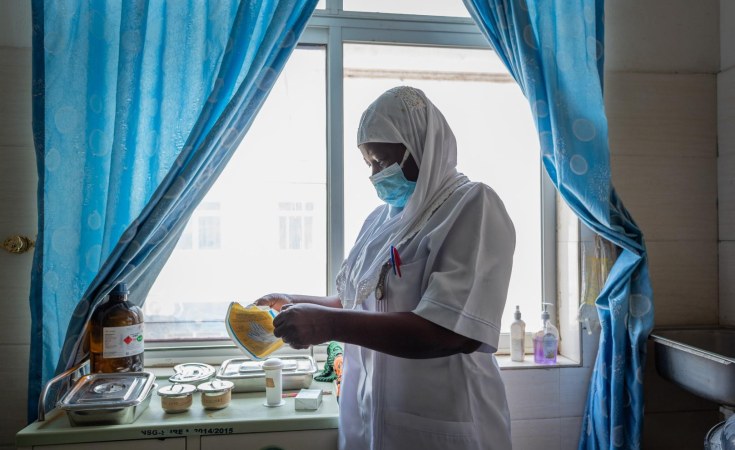In the largest single round of Human Papillomavirus (HPV) vaccination in Africa, Nigeria on Tuesday, October 24, 2023, introduced the vaccine into its routine immunization system, aiming to reach 7.7 million girls to stem the menace of cervical cancer among women. Mostly caused by the HPV, parents can avoid the physical and financial pains of the disease by protecting their young girls with a single dose of the vaccine.
A malignant tumour that grows in the lower part of the uterus, cervical cancer is the third most common cancer and the second most frequent cause of cancer deaths among women aged between 15 and 44 years in Nigeria. In 2020 - the latest year for which data is available - the country recorded 12,000 new cases and 8,000 deaths from cervical cancer. In 2018, with 31,955 cases in West Africa, Nigeria accounted for almost half (14,943) with 10,403 deaths (28 deaths every day) in the country.
Dr Muhammad Ali Pate, Coordinating Minister of Health and Social Welfare, speaking on the commencement of the vaccination drive, said the death of "8,000 Nigerian women yearly from a disease that is preventable is completely unacceptable."
He stated that the vaccination campaign "Is an opportunity to safeguard our girls from the scourge of cervical cancers many years into the future. As a parent myself, I have four daughters, all of them have had the same HPV vaccine to protect them against cervical cancer.
"I'd like to implore fellow parents to dutifully ensure that this generation of our girls disrupt the preventable loss of lives to cervical cancer in addition to other untold hardships, loss and pain."
Under the vaccination drive, girls aged 9-14 years will receive a single dose, which is highly efficacious in preventing infection with HPV types 16 and 18 which are known to cause at least 70% of cervical cancers. Over 16 million girls could be protected in Nigeria alone by 2025, according to the World Health Organisation (WHO).
The five-day mass vaccination campaign is being carried out in schools and communities in 16 states and Federal Capital Territory (FCT). The vaccine will then be incorporated in routine immunization schedules within health facilities. The second phase of the vaccination introduction is set to start in May 2024 in 21 states.
Over 35,000 health workers have been trained in preparation for the campaign and subsequent vaccine delivery in all health facilities with vaccination sites established in the 4,163 wards across the 16 states and FCT. It is expected that the phase one rollout will ensure that no eligible girl is left behind. To offset the cost, the vaccine was provided free by the Federal Ministry of Health through the National Primary Health Care Development Agency with support from Gavi, the Vaccine Alliance, United Nations Children's Fund (UNICEF), World Health Organisation (WHO) and other partners. UNICEF has procured nearly 15 million HPV vaccines on behalf of the Government of Nigeria.
The cervical cancer preventive vaccination drive is a welcome development. This will limit the profound loss and devastation on families across Nigeria where it disproportionately impacts the lives of women. We believe that if the current drive is well implemented, it will prevent the disease and save our adolescent girls at no cost.
It is, therefore, essential that all stakeholders work in concert to reach the target population. The buy-in of parents in the HPV vaccine programme is paramount because they are not only the primary caregivers, they play significant roles in the decision-making process for the uptake of the vaccination.
Moreover, there must be massive enlightenment campaigns to counter any negative narrative that will arise against this initiative. In this vein, all mass media organs of the Federal Ministry of Information and concerned state governments must be involved and such enlightenment campaign materials produced in local languages. Government and its partners must do everything possible to assuage the fears of the vaccine sceptics. In addition, community volunteers should be engaged for effective house-to-house mobilization and talks with parents about the HPV vaccination.
Towards this, UNICEF has already procured informational materials, including radio and TV jingles in multiple local languages to dispel misinformation and rumours. Additionally, it has facilitated logistical support for vaccination campaigns and distributed cold chain equipment for vaccine preservation.
And since there is no cure yet for cervical cancer, after vaccination, large-scale screening should be a priority as many women carry the disease without being aware of it. Early detection is always the solution to treating cervical cancer, and that is where pelvic screening comes in.
We implore women to take advantage of screening programmes geared towards the prevention of this cancer, including Papanicolaou (Pap) smear and HPV screening. They should also undertake secondary preventive measures that detect early-stage cervical cell abnormality and the virus's presence.
We believe this is an opportunity that our female adolescents should take full advantage of and they should be encouraged to do so.


